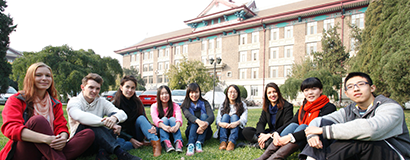In an era of global pandemic, there are raising alarms about the misuse and abuse of life science research. Governments and civil societies struggle to establish and implement appropriate oversight mechanisms to mitigate biorisks and maintain international biological arms control norms.
On Nov. 29, 2022, a side event themed The Biological Weapons Convention and Tianjin Biosecurity Guidelines for Codes of Conduct for Scientists took place in Palais des Nations, Geneva during the Ninth Review Conference of the Biological Weapons Convention (BWC).
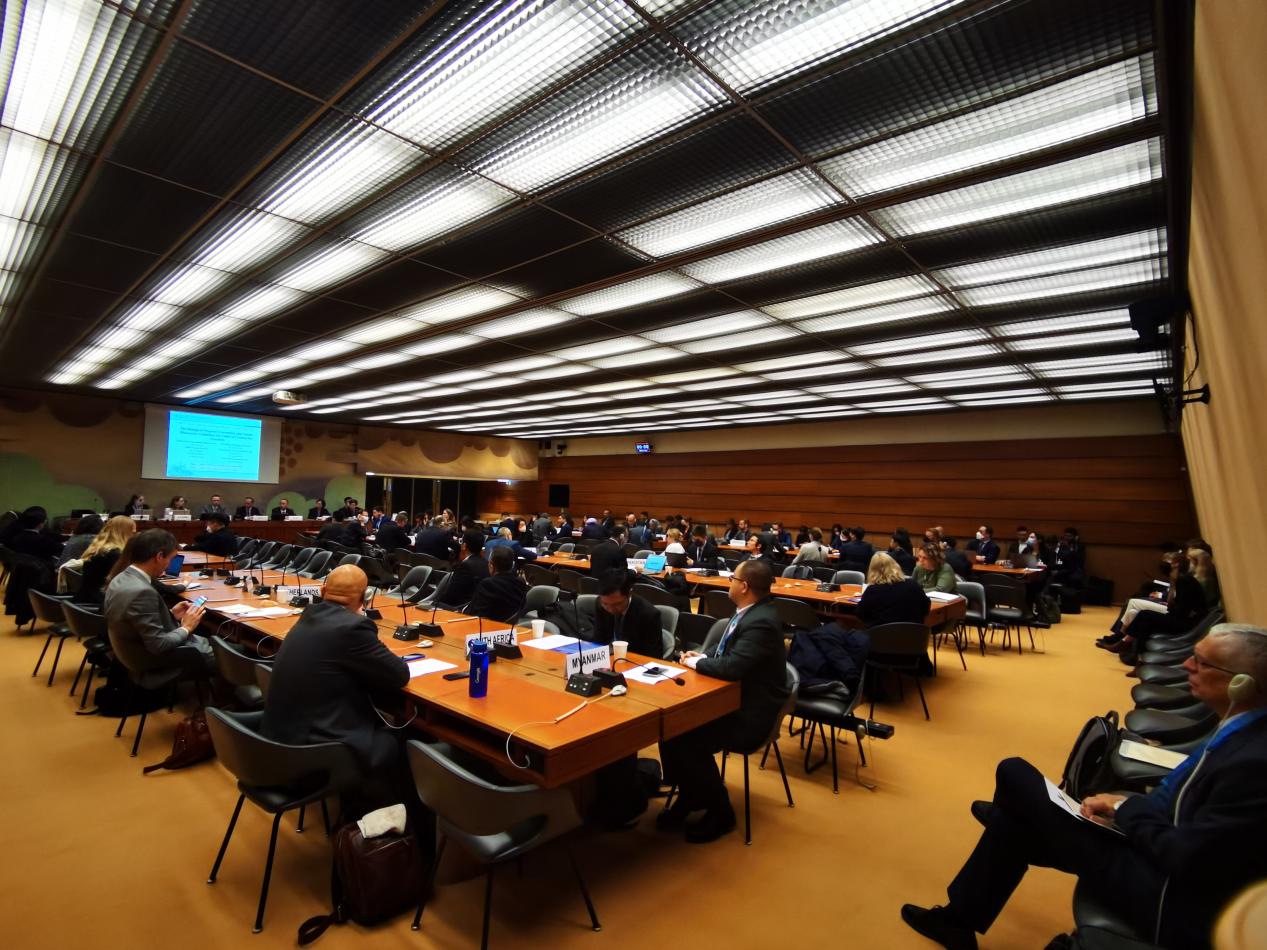
Sponsored by the Ministry of Foreign Affairs of China, and co-organized by Center for Biosafety Research and Strategy at Tianjin University (CBRS), Johns Hopkins Center for Health Security, and InterAcademy Partnership, the event sought the endorsement of the Tianjin Biosecurity Guidelines by the BWC to mitigate biorisks and enhance the implementation of the Convention at various levels.
H.E. Li Song, Head of the Chinese delegation to the Ninth Review Conference of the BWC and China’s ambassador for disarmament affairs, Mr. Daniel Feakes, Head of the Implementation support Unit (ISU) of the BWC and Secretary-General of the 9th Review Conference, and Dr. Hu Wenping, Executive Vice President of Tianjin University, attended the meeting and delivered speeches. Experts from Tianjin University, the Johns Hopkins Center for Health and Safety (USA) and the InterAcademy Panel (IAP) made keynote speeches and more than 80 officials from dozens of countries and organizations joined the discussion in the side events. Zhang Weiwen, Director of CBRS, chaired the side event.
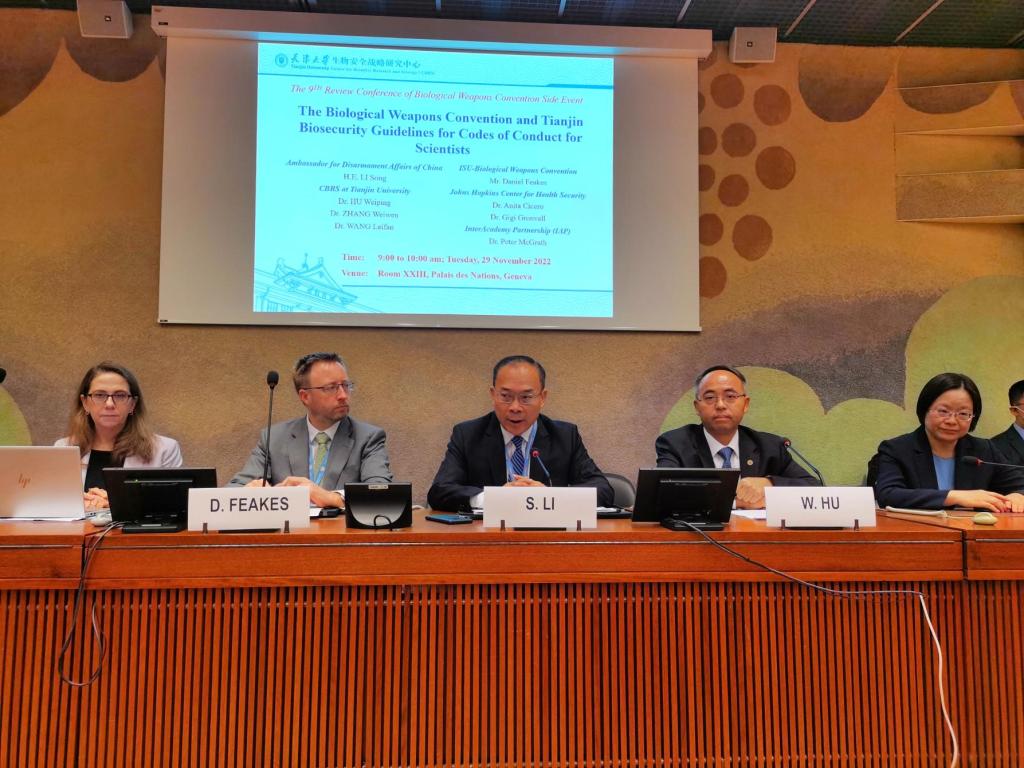
Ambassador Li Song noted that the Tianjin Biosecurity Guidelines was a timely international public measure provided to the international community by scientists from more than 20 countries and embodied a fascinating story of enhanced biosafety international cooperation. It is an important mark of responsible scientific dialogue promoted under the framework of the BWC. Initiated by China and Pakistan in 2016, and actively promoted by Tianjin University, Johns Hopkins University and IAP in the international scientific community, the Tianjin Biosecurity Guidelines reflects the collective wisdom and efforts of scientists from more than 20 countries who trudged on relentlessly during the pandemic to make the Guidelines into being.
Li Song said that the Tianjin Biosecurity Guidelines is a positive and useful attempt by the international community to reduce biosafety risks and promote bioscience for the benefit of humanity. It reflects the determination and wisdom of countries to strengthen biosafety norms and to reach international consensus on the responsible use of life science achievements.
“China is now working with other States Parties to actively promote the endorsement of the Tianjin Biosecurity Guidelines by the Ninth Review Conference of the BWC. We encourage all stakeholders to voluntarily adopt the Guidelines to better prevent the misuse of biotechnology and ensure the healthy development of biotechnology.”
Li Song stressed that the Tianjin Biosecurity Guidelines, though originating in China, has transformed into a global initiative. “The conception, development and promotion of the Tianjin Biosecurity Guidelines is a vivid portrayal of true multilateralism, proving once again in a special way that in the face of global public security challenges, mankind is a community of shared future and the interests of all parties are closely linked.”
Li Song pointed out that with the Tianjin Biosecurity Guidelines as a new starting point, China is willing to work with the States Parties and the international community to improve global biosafety governance system, address new biosafety challenges, and promote the vigorous development of biotechnology in the right direction of better health and safety.
Tianjin University’s Executive Vice President Hu Wenping introduced CBRS in the meeting. CBRS is the first think tank focusing on biosafety research and strategy in China and a UN affiliated NGO in this field. With the objective of conducting research and providing technical and policy supports to biological arms control and general biosafety management, CBRS has been very concerned to enhance the awareness of biosafety issues and to reinforce the moral self-discipline in scientific community in China and worldwide.
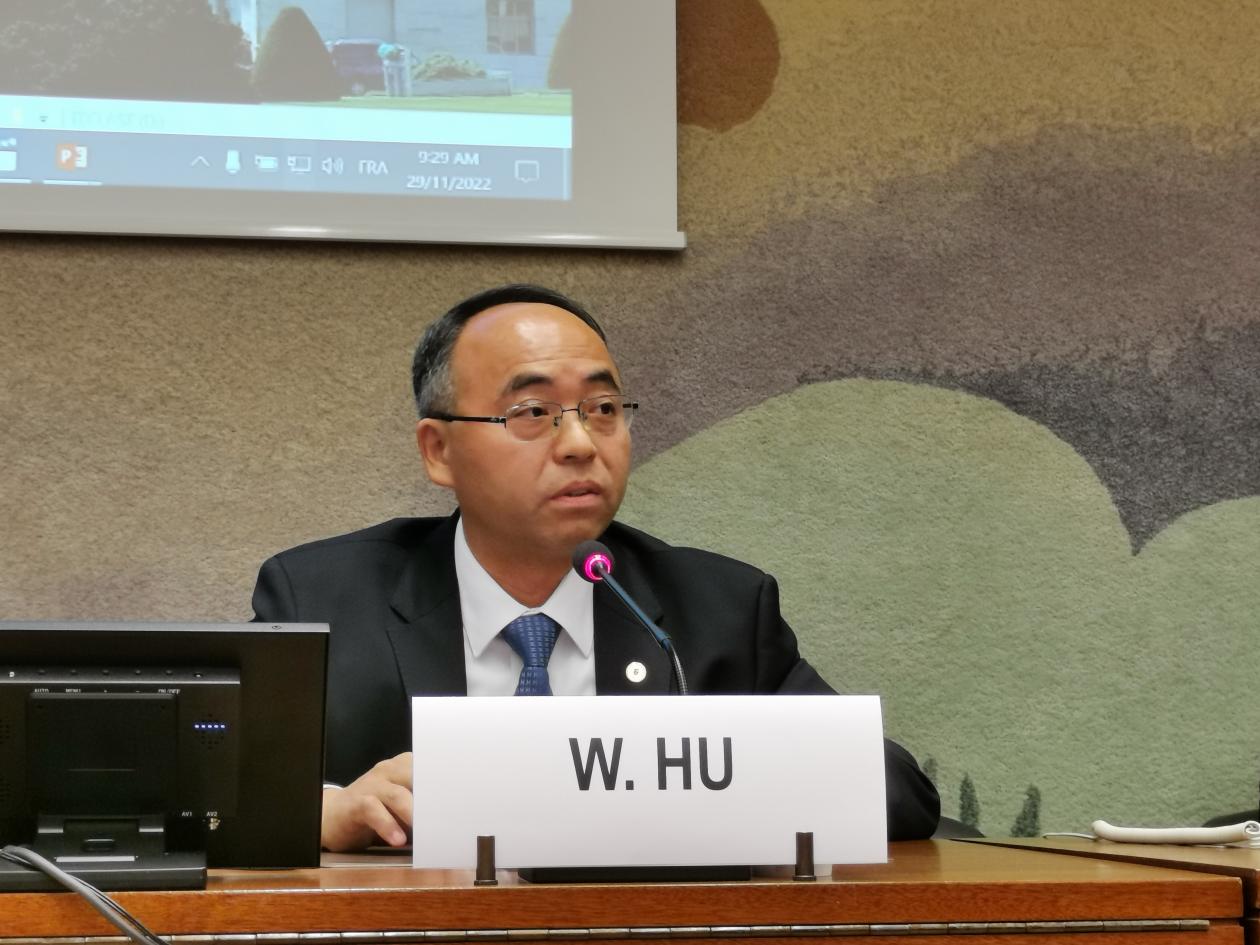
Prof. Gigi Gronvall from the Johns Hopkins Center for Health Security called for special attention of scientists to the application of the Tianjin Biosecurity Guidelines and explained the specific content of each basic principle of the Guidelines.
Dr. Peter McGrath, IAP Secretariat, mentioned that the Tianjin Biosecurity Guidelines has been supported by more than 150 national institutions and reflects the consensus of the international scientific community. It is greatly approved and promoted by IAP.
Mr. Daniel Feakes, Head of the ISU, said that the Tianjin Biosecurity Guidelines sets an example for the international scientific community to promote and strengthen the role of the BWC and has been fully discussed and highly endorsed by the BWC process.
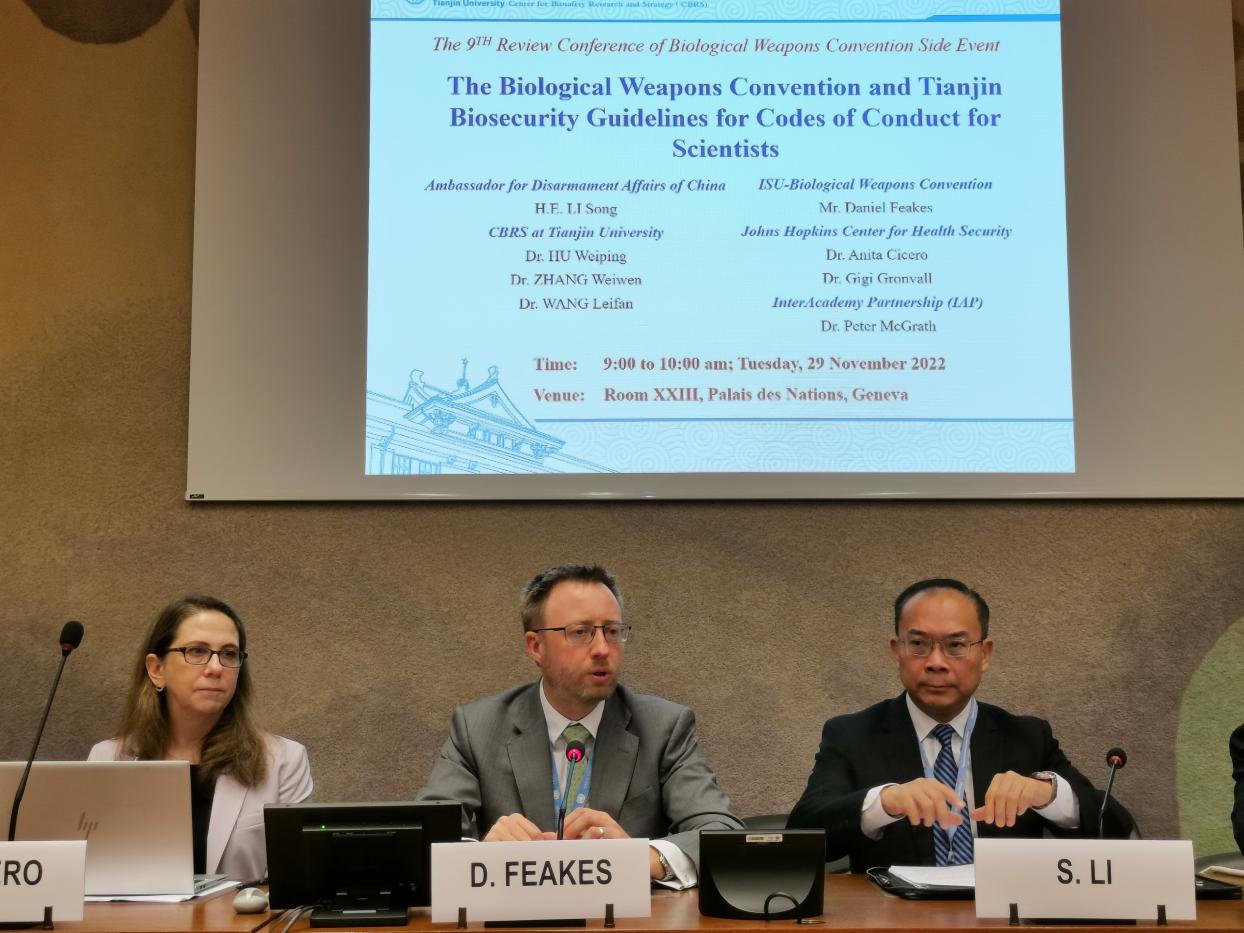
Representatives from States Parties, including Pakistan, Brazil, Russia, the Philippines and Cuba, spoke in support of the Tianjin Biosecurity Guidelines. Emphasizing the importance of promoting responsible scientific research and developing a code of conduct for scientists, the representatives fully acknowledged the transparency and inclusiveness the Guidelines exhibits and thought highly of the leading role China played in it. They also urged the Ninth Review Conference of the BWC to endorse the Tianjin Biosecurity Guidelines as one of its important outcomes.

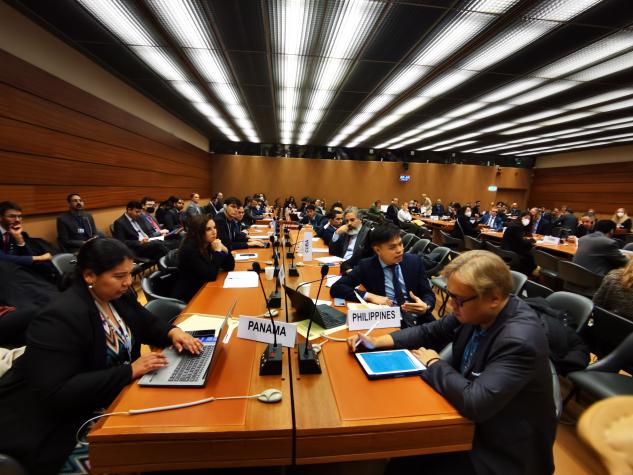
The Tianjin Biosecurity Guidelines are a set of guiding principles and standards of conduct designed to promote responsible science and strengthen the national and institutional biosafety governance. Scientists and their institutions around the world are encouraged to recognize and uphold that bioscience should not be misused for harmful purposes and that scientists should play an active role in this regard.
By Zhang Xu
Editor: Eva Yin






